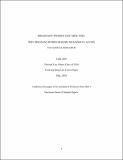| dc.description.abstract | Clinical research in pregnant women is controversial, so much so that is almost universally avoided by the pharmaceutical industry and heavily restricted by the Department of Health and Human Services in the regulations governing IRB approval of clinical studies. Many would argue that the risks to the fetus justify pregnant women’s restricted access to clinical drug. I respond that these perceived risks are the result of misplaced, exaggerated fears about drug safety, tort liability, and speculative concerns about pregnant women’s potent conflicts of interest with their fetus. I further assert that for the vast majority of pregnant women who do use medications during pregnancy, the psychological and medical consequences of not knowing whether their medications are safe and effective are far worse than the hazards of allowing those women to participate freely in clinical trials.
Section I of this paper identifies the problem of women’s present inability to make informed decisions about medication during pregnancy, and the need for clinical drug testing to rectify that problem.
Section II argues that the current predominant method of assessing drug safety for pregnant women and their fetuses via post-market registries is inadequate, and advocates for clinical trials instead.
Section III outlines the history government regulation of pregnant women’s drug-use and other medical decisions and the discriminatory assumptions inherent about women that are conveyed through the government’s actions. I then discuss the Department of Health and Human Services regulation on pregnant women’s participation in clinical research. I critique the government’s restrictive approach on a policy level and also through a constitutional law lens. I conclude that on a policy level, the current regulations inappropriately perpetuate stereotypes that pregnant women are irresponsible, mentally unsound, incapable of acting in their and their child’s best interests, and otherwise in special need of paternalistic restrictions on their freedom. On the constitutional question, I conclude that while a Due Process challenge to the legislation is unlikely to prevail, there is a considerable possibility that the regulations could be held to violate the Equal Protection Clause of the Constitution.
Section IV provides a counterargument to industry claims that clinical research in pregnant subjects is impracticable because of the threat of litigation. I respond that under current tort law, the industry faces far greater exposure to liability than they would have if they conducted research on pregnancy safety, because their routine failure to conduct adequate experimentation in pregnant women can give rise to strict liability for their failure to warn and failure to test.
Section V proposes and compares various legal mechanisms and incentives that may accomplish better industry inclusion of pregnant women in clinical trials. The three mechanisms I examine are government-run or subsidized studies, FDA labeling requirements, or outright requirements of pregnancy testing as a condition of IRB or FDA approval. | en_US |


